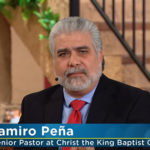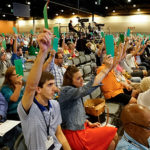FRISCO—Traditional distinctive Baptist beliefs about soul competency and the priesthood of believers may be endangered more by laziness and a laissez faire attitude by laity than from any frontal assault by fundamentalism, said Dennis Wiles, pastor of First Baptist Church in Arlington.
Dennis Wiles“Church life has changed,” Wiles told a workshop at the Baptist General Convention of Texas annual meeting in Frisco. “We live in an electronic, eclectic, existential and experiential culture.”
Attendance at church business conferences has diminished in many congregations, and some busy young church members may be inclined to delegate decision-making to others rather than accept that responsibility themselves, he noted.
But Baptist polity—including local church autonomy and congregational governance carried out through democratic processes—is rooted in Baptist beliefs about soul competency and the priesthood of believers, he said.
Wiles distinguished between the two closely related principles. Soul competency is general and applicable to all people everywhere, while the priesthood of believers applies specifically to Christians, he explained.
Soul competency
“Soul competency means every human being has the freedom to choose,” he said. “We are accountable because we are free moral agents.”
Enduring Baptist principles must have a biblical basis, a historical context, a theological construct and a practical application, Wiles said.
The Old Testament book of Genesis and its account of humankind’s creation in God’s image provide the groundwork for the principle of soul competency, he said.
Sign up for our weekly edition and get all our headlines in your inbox on Thursdays
“The human soul is competent to make decisions and accountable because we are free moral agents,” he said.
The doctrine of the priesthood of believers grows out of ancient Israel’s calling to be a “kingdom of priests” in the Old Covenant. 1 Peter 2 in the New Testament expands that role to include the church, he explained.
“Every believer is a priest before God,” Wiles said. “It’s about access. You have direct access to God through Jesus, direct access to the Scripture and the ability to interpret it because of direct access to the Holy Spirit, and direct access to the mission of God.”
Historically, Baptists can trace their distinctive understanding about soul competency to Thomas Helwys and the earliest British Baptists. On the other hand, Baptists share the principle of the priesthood of believers with other Protestants who were influenced by Martin Luther, Wiles asserted.
In terms of a theological construct, the Baptist commitment to community and the church as a called-out body of believers helps keep soul competency and the priesthood of believers from degenerating into individualistic religion, he said.
“It is lived out and thought out through community,” he said.
Four who shaped understanding
Wiles pointed to four individuals in the last 150 years who shaped Baptist understanding of soul competency and the priesthood of believers:
• E.Y. Mullins, president of Southern Baptist Theological Seminary in the early 20th century, wrote Axioms of Religion and chaired the committee that drafted the 1925 Baptist Faith & Message confessional statement.
• George W. Truett, longtime pastor of First Baptist Church in Dallas, championed religious liberty.
• Herschel Hobbs, pastor-theologian from Oklahoma, chaired the 1963 revision of the Baptist Faith & Message and influenced a generation of Sunday school teachers through the lesson commentaries he wrote for the Baptist Sunday School Board.
• Bill Pinson, executive director emeritus of the BGCT, led a renewed emphasis among Texas Baptists on Baptist distinctives and heritage.
Principles of soul competency and the priesthood of believers are “woven into the fabric of church life and into the lives of Baptist believers” in multiple ways, beginning with the doctrine of salvation, Wiles noted.
“We grow by conversion, not by coercion,” he said.
Baptists’ dedication to religious liberty for all people and the separation of church and state grow out of a commitment to those key principles, he added. Likewise, congregational governance and a reluctance to accept any church hierarchy also stem from that same source.
Finally, Baptists’ sense of mission in the world reflects the principle of the priesthood of all believers and the recognition every soul is accountable to God.
“As priests, we have a responsibility to represent God in the world,” Wiles said.














We seek to connect God’s story and God’s people around the world. To learn more about God’s story, click here.
Send comments and feedback to Eric Black, our editor. For comments to be published, please specify “letter to the editor.” Maximum length for publication is 300 words.